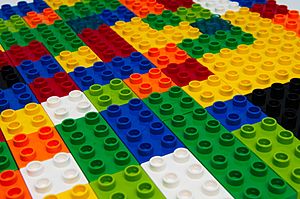Modularity facts for kids
Modularity is a general systems concept where a system’s components may be separated and recombined. It refers to both the tightness of coupling between components, and the degree to which the “rules” of the system architecture enable (or prohibit) the mixing and matching of components. Its use, however, can vary somewhat by context:
- In biology, modularity (biology) refers to the concept that organisms or metabolic pathways are composed of modules.
- In the Five Principles of New Media as defined by Lev Manovich, modularity covers the principle that new media is composed of modules or self sufficient parts of the overall media object.
- In the study of networks, modularity (networks) is a benefit function that measures the quality of a division of a network into groups or communities.
- In mathematics, the modularity theorem (formerly the Taniyama–Shimura–Weil conjecture) establishes a connection between elliptic curves and modular forms.
- In mathematics, modular lattices are partially ordered sets satisfying certain axioms
- In cognitive science, the modularity of mind refers to the idea that the mind is composed of independent, closed, domain-specific processing modules.
- Specifically, see visual modularity, for an article relating to the various putative visual modules.
- Specifically, see language module, for an article relating to the putative language module.
- Modular design, an engineering technique that builds larger systems by combining smaller subsystems
- Modular programming, modular design as applied to software
Modular
Something is modular when it consists of two or more pieces that are easy to replace. These are usually simple objects. They can be connected together to form more complex objects. For example, Lego pieces are modular. Complex objects may by themselves be modular and used to create even more complex objects by piecing them together.
See also
 In Spanish: Modularidad para niños
In Spanish: Modularidad para niños

All content from Kiddle encyclopedia articles (including the article images and facts) can be freely used under Attribution-ShareAlike license, unless stated otherwise. Cite this article:
Modularity Facts for Kids. Kiddle Encyclopedia.


